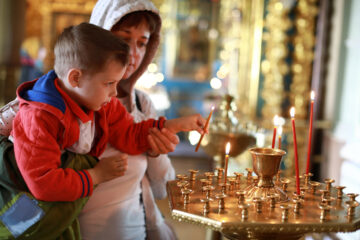Protopresbyter Themistoklis Mourtzanos
‘…and you will receive a rich welcome into the eternal kingdom of our Lord and Savior Jesus Christ’ (2 Peter 1, 11).
The feast of the Transfiguration, largely forgotten as regards much of our secularized life, is a great festival and a reminder that our life is a journey towards the kingdom of God. Together with the Lord’s baptism, which is the first Theophany in the New Testament, the Metamorphosis is, in reality, the second. It shows us that we don’t believe in an idea of a god, a philosophy of a god, a change-in-behavior type of god, nor in a god who simply promises us a posthumous reward, on an individual ‘good person’ level. Rather, we believe in a Triune God who, in the person of Christ, donned human nature, became one of us, in order to bestow on us the grace to become transfigured into that which we dreamed of from the beginning of history: ‘that we may be made divine’ (Athanasios the Great).
Religious tradition attempts to answer the great pain which we call ‘human imperfection’ by emphasizing evil and death. Without knowing it, somewhere at its heart, it experiences the response of our own spiritual tradition: that we’ve been made in the image of God and strive to become his likeness. Consciously or unconsciously unaware of the presence of the Triune God. Religious tradition constructs deities, deifies the human ego and its achievements and, through philosophy, broadens the ability of the human mind to understand and interpret the world and life. It also seeks expiation for any mistakes that may have been made as a result of unbridled desires, since our will is strong and temptations are manifold. We’re all subject to the law of authority, of domination, of wanting to be in charge. We enjoy imposing ourselves, to a greater or lesser extent, on other people and on the world, so that we vindicate ourselves. At the same time, we recognize our failure to be what we really want to be, either choosing compromise and the mitigation of our guilt and thus enjoying even more whatever power we have, or we strive to give a positive cast to our life. But we feel we’ll be defeated by death and we seek some final consolation in religious metaphysics.
The spiritual tradition of our faith, however, doesn’t dwell on this kind of inadequate consolation. It requires us to encounter Christ. We are to ascend with him a little higher than viewing this life with the eyes of the world, or, as it were, of human science and philosophy, and we are to allow ourselves to be transfigured. This isn’t merely a moral transfiguration. Christ wasn’t transfigured into a better person. He revealed to us the integrity of his divine and human nature, which awaits all of us, by grace, provided we follow him and desire to erect our tabernacles close to him. The disciples weren’t good people of their time, but were those who wanted to love Christ. They were, however, still people with their own characters, their own faults and errors, but also with their own progress, as was apparent later on when they were able to cope with Christ’s passion and even his resurrection. Christ was transfigured in order to show a different glory, that of God’s kingdom, in which death, imperfection, passions and errors have no place; but light does. It’s an ascent and an experience in which the heart beats eternally for him whom it loves. There’s joy in the encounter with the past, as expressed by Moses, and with the last times, represented by the Prophet Elijah- since he didn’t die. Both of them were present at the Transfiguration. There’s joy at the voice of the Father, which was heard as confirmation of love. There’s a foretaste of the experience of the Holy Spirit, which adorns everything with the light of joy, of love, of peace, of speech and dialogue about another world, which connects with ours through the cross and death.
Our faith doesn’t comfort us with the fact that we won’t die or with the thought that everything will be beautiful in the next life. What redeems us is the quest for the person of Christ in our life. In the Church and in its life. The signs of our transfiguration are those things which have as their source our relationship with Christ. This is love which is a transcendence of self-reliance, since we’re called upon to abandon our personal Tabor and descend into the world, to other people, and to share our joy. To share the victory over death, particularly spiritual death, which is something our culture wants to make us deny, as if we’re conquerors and vanquishers of this world – until the time comes when the emptiness of being mortal shows us that no one is invincible. Until we’re prepared to meet with each and every one of our neighbors. Until we have the humility to know our limitations. Until we’re prepared to continue our life, not with exploitation of others as our benchmark, but on the basis of prayer and service for them. It’s the refusal to take part in the game of threats, violence, murder, and coming out on top at whatever cost. In other words, it’s accompanying Christ spiritually in the Church and experiencing the Gospel.
This way of life requires humility and awareness. But it also requires a confirmation of joy, that Christ is present and doesn’t abandon us. We confirm this in the Church, which changes us, not by comforting us as regards that which is inevitable, but by making us undertake our responsibility for whatever we can, for whatever we’ve been called to. All of us who restrict our change to mere morality or the comfort of being good people remain in the present. Those of us who trust in Christ and await his presence, living the love of the Church in practice, won’t be left alone. We’ll make our way towards his kingdom, the eternal encounter with love and the resurrection, with the sanctity which saves.
Source: pemptousia.com




0 Comments